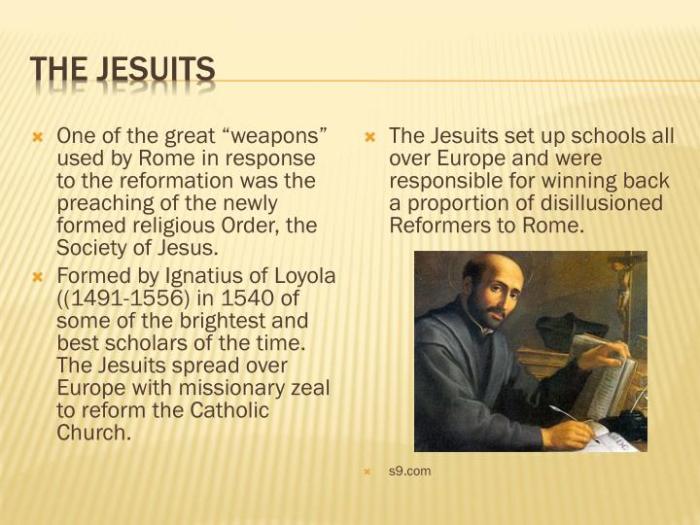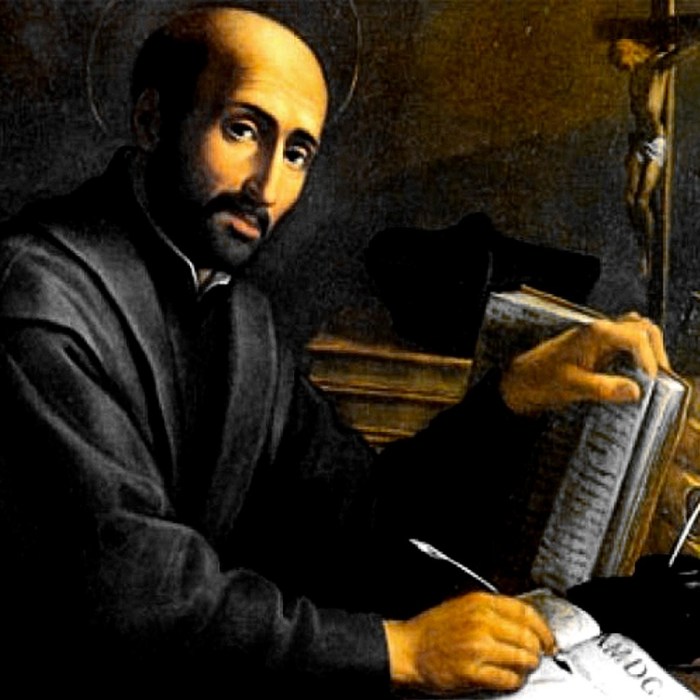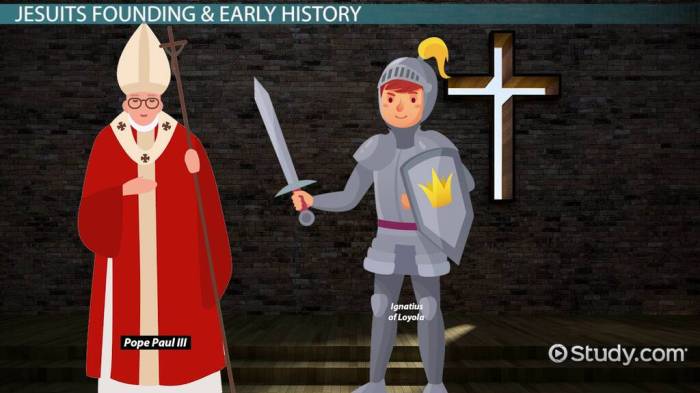Jesuits definition ap world history – The Jesuits, a Catholic religious order founded in the 16th century, played a pivotal role in the Catholic Reformation and the spread of Catholicism worldwide. Their distinctive approach to education, missionary work, and intellectual pursuits left an enduring legacy on Western civilization.
This comprehensive guide provides an in-depth examination of the Jesuits’ history, educational contributions, missionary endeavors, intellectual impact, and controversies. It offers a nuanced understanding of this influential order’s multifaceted role in shaping the course of world history.
Historical Context

The Society of Jesus, commonly known as the Jesuits, is a religious order of the Catholic Church. Founded in 1540 by Ignatius of Loyola, the order quickly became one of the most influential forces in the Catholic Reformation and the spread of Catholicism around the world.
The Jesuits were founded during a time of great religious upheaval in Europe. The Protestant Reformation had challenged the authority of the Catholic Church, and the Church was struggling to respond. Ignatius of Loyola, a former soldier, believed that the Church needed a new kind of religious order that could be more effective in combating heresy and spreading the faith.
Goals and Early Activities
The Jesuits were founded with a number of specific goals in mind. These included:
- To combat heresy and defend the Catholic faith.
- To educate young people in the Catholic faith.
- To spread the Catholic faith to new lands.
The Jesuits quickly became known for their missionary work. They traveled to all corners of the globe, from the Americas to Asia to Africa. They established schools, hospitals, and orphanages, and they worked to convert people to Catholicism.
Role in the Catholic Reformation
The Jesuits played a major role in the Catholic Reformation. They were instrumental in the Council of Trent, which reformed the Catholic Church and strengthened its authority. They also played a leading role in the Counter-Reformation, which sought to win back Protestants to the Catholic Church.
Educational Contributions

The Jesuits’ approach to education emphasized the study of classical languages, philosophy, and science. They believed that a well-rounded education was essential for developing the whole person, both intellectually and spiritually.
Famous Jesuit Schools and Universities, Jesuits definition ap world history
The Jesuits founded numerous schools and universities throughout Europe and beyond. Some of the most famous include:
- Collegio Romano (Rome, Italy)
- University of Paris (France)
- University of Oxford (England)
- University of Salamanca (Spain)
- University of Coimbra (Portugal)
These institutions played a major role in the development of education in Europe and helped to spread Jesuit educational ideals around the world.
Missions and Exploration

The Jesuits played a significant role in the Catholic Church’s missionary efforts during the Age of Exploration. They were instrumental in spreading Christianity to indigenous populations in the Americas, Asia, and Africa.
Jesuit missionaries sought to convert indigenous peoples to Catholicism through various means, including preaching, education, and social welfare work. They established missions and schools in remote areas, where they taught the local population about Christianity and provided medical care and other assistance.
The Jesuits’ missionary work had a lasting impact on the cultural and religious landscape of many regions, particularly in the Americas and Asia.
Exploration and Mapping
In addition to their missionary activities, the Jesuits also made significant contributions to exploration and mapping. Jesuit missionaries often traveled to uncharted territories and provided valuable information about the geography and cultures of these regions. They collected data on local flora and fauna,绘制地图,并记录了他们与当地人民的互动.
The Jesuits’ exploration and mapping efforts contributed to the expansion of European knowledge about the world and played a role in shaping European perceptions of other cultures. Their work also facilitated trade and colonization, as European powers sought to exploit the resources and opportunities in the newly discovered lands.
Intellectual and Cultural Impact

The Jesuits exerted significant influence on intellectual thought and cultural development. They played a pivotal role in the development of Baroque art and architecture, and their patronage of artists and musicians shaped the artistic landscape of the period.
Contributions to Theology and Philosophy
The Jesuits made notable contributions to theology and philosophy. They were instrumental in the development of Scholasticism, a philosophical method that emphasized logical reasoning and the synthesis of faith and reason. Jesuits also played a key role in the Counter-Reformation, defending Catholic doctrine against the challenges posed by Protestantism.
Contributions to Science
The Jesuits made significant contributions to science. They founded numerous observatories and universities, which became centers of scientific research and education. Jesuit scientists, such as Athanasius Kircher and Christoph Clavius, made important discoveries in astronomy, mathematics, and physics.
Role in Baroque Art and Architecture
The Jesuits played a major role in the development of Baroque art and architecture. They commissioned grand churches and other buildings that were designed to impress and inspire the faithful. Jesuit churches were typically characterized by elaborate ornamentation, soaring domes, and dramatic lighting effects.
Patronage of Artists and Musicians
The Jesuits were generous patrons of artists and musicians. They commissioned works from leading artists, such as Rubens, Caravaggio, and Bernini. Jesuit musicians composed and performed sacred music that was highly influential in the development of Baroque music.
Controversies and Legacy

The Jesuit order has been embroiled in numerous controversies throughout its history, including accusations of political intrigue and involvement in international affairs. In the 16th century, the Jesuits were accused of being a “secret society” that sought to undermine the authority of the Catholic Church.
In the 17th century, they were accused of involvement in the Thirty Years’ War, a conflict that devastated much of Europe.
In the 18th century, the Jesuits were expelled from several countries, including France, Portugal, and Spain. The order was eventually suppressed by Pope Clement XIV in 1773, but it was restored in 1814.
Legacy
Despite the controversies, the Jesuit order has had a profound impact on the Catholic Church and society. The Jesuits have played a major role in the spread of Christianity, and they have founded numerous schools, colleges, and universities around the world.
Jesuit scholars have made significant contributions to a wide range of fields, including theology, philosophy, science, and literature.
The Jesuit order continues to be a major force in the Catholic Church today. Jesuits hold important positions in the Vatican and in dioceses around the world. They continue to play a vital role in education, social justice, and other areas of ministry.
Clarifying Questions: Jesuits Definition Ap World History
What were the primary goals of the Jesuit order?
The Jesuits were founded with the mission of promoting the Catholic faith, particularly through education and missionary work.
How did the Jesuits contribute to education?
The Jesuits established a global network of schools and universities that emphasized classical languages, philosophy, and science, and their educational approach influenced educational practices throughout Europe and beyond.
What was the Jesuits’ role in missionary work?
The Jesuits were instrumental in spreading Catholicism in the Americas, Asia, and Africa, and their missionary efforts often involved cultural exchange and the establishment of educational institutions.